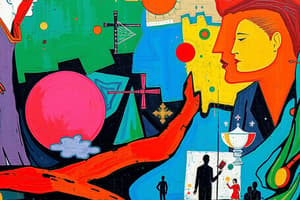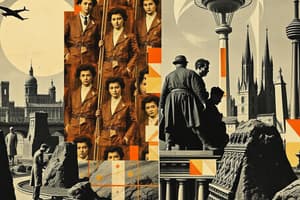Podcast
Questions and Answers
What is the 'most serious defect' Aldous Huxley identifies in the story of Brave New World?
What is the 'most serious defect' Aldous Huxley identifies in the story of Brave New World?
The Savage is offered only two alternatives, an insane life in Utopia, or the life of a primitive in an Indian village.
What does Huxley suggest as a third alternative for the Savage?
What does Huxley suggest as a third alternative for the Savage?
A community of exiles and refugees from the Brave New World, living within the borders of the Reservation.
According to Huxley, what is the "conscious and intelligent pursuit of man's Final End"?
According to Huxley, what is the "conscious and intelligent pursuit of man's Final End"?
The unitive knowledge of the immanent Tao or Logos, the transcendent Godhead or Brahman.
What does Huxley say is the "first question to be asked and answered in every contingency of life" in this alternative community?
What does Huxley say is the "first question to be asked and answered in every contingency of life" in this alternative community?
Huxley believes that chronic remorse is a desirable sentiment.
Huxley believes that chronic remorse is a desirable sentiment.
Huxley suggests that dwelling on past artistic shortcomings can be beneficial for future artistic endeavors.
Huxley suggests that dwelling on past artistic shortcomings can be beneficial for future artistic endeavors.
Huxley argues that the Savage's upbringing among the practitioners of a fertility cult and Penitente ferocity would have justified his rational pronouncements in Brave New World.
Huxley argues that the Savage's upbringing among the practitioners of a fertility cult and Penitente ferocity would have justified his rational pronouncements in Brave New World.
Huxley believes that sanity is impossible.
Huxley believes that sanity is impossible.
Huxley suggests that the achievement of social stability is the only goal of the totalitarian society in Brave New World.
Huxley suggests that the achievement of social stability is the only goal of the totalitarian society in Brave New World.
Huxley believes that the use of atomic energy represents the final and most searching revolution.
Huxley believes that the use of atomic energy represents the final and most searching revolution.
Huxley believes that the totalitarian states of the future will resemble those of the past, with their reliance on violence and coercion.
Huxley believes that the totalitarian states of the future will resemble those of the past, with their reliance on violence and coercion.
Huxley suggests that the widespread use of atomic energy will lead to a period of peace.
Huxley suggests that the widespread use of atomic energy will lead to a period of peace.
Huxley believes that the use of applied science should be limited to serving the needs of individual human beings.
Huxley believes that the use of applied science should be limited to serving the needs of individual human beings.
Huxley believes that the spread of atomic energy and its consequences will inevitably lead to a single, supranational totalitarian state.
Huxley believes that the spread of atomic energy and its consequences will inevitably lead to a single, supranational totalitarian state.
According to Aldous Huxley, which of the following are features of the third alternative he proposes for the Savage?
According to Aldous Huxley, which of the following are features of the third alternative he proposes for the Savage?
Huxley believes that the future will be characterized by:
Huxley believes that the future will be characterized by:
According to Huxley, what are the main elements of the 'foolproof system of eugenics' being developed in the future?
According to Huxley, what are the main elements of the 'foolproof system of eugenics' being developed in the future?
Huxley believes the future is inevitable and predetermined, with little room for human agency or choice.
Huxley believes the future is inevitable and predetermined, with little room for human agency or choice.
Huxley believes that the potential for widespread use of atomic energy is the only challenge to the future of humanity and civilization.
Huxley believes that the potential for widespread use of atomic energy is the only challenge to the future of humanity and civilization.
What is the significance of the quote "You pays your money and you takes your choice" in Huxley's analysis of the future?
What is the significance of the quote "You pays your money and you takes your choice" in Huxley's analysis of the future?
What is the central argument presented throughout Huxley's Foreword to Brave New World?
What is the central argument presented throughout Huxley's Foreword to Brave New World?
Flashcards
Remorse
Remorse
A feeling of deep regret, often associated with a sense of guilt.
Sanity
Sanity
A state of mental health characterized by clear thinking, rational decision-making, and a balanced perspective.
Utopia
Utopia
A hypothetical society in Aldous Huxley's Brave New World where all aspects of life are controlled, and individuality is suppressed.
Primitive
Primitive
Signup and view all the flashcards
Decentralist Economics
Decentralist Economics
Signup and view all the flashcards
Kropotkinesque Cooperation
Kropotkinesque Cooperation
Signup and view all the flashcards
Final End Principle
Final End Principle
Signup and view all the flashcards
Greatest Happiness Principle
Greatest Happiness Principle
Signup and view all the flashcards
Tao or Logos
Tao or Logos
Signup and view all the flashcards
Brahman
Brahman
Signup and view all the flashcards
Totalitarianism
Totalitarianism
Signup and view all the flashcards
Social Conditioning
Social Conditioning
Signup and view all the flashcards
Propaganda
Propaganda
Signup and view all the flashcards
Censorship
Censorship
Signup and view all the flashcards
Security
Security
Signup and view all the flashcards
Economic Security
Economic Security
Signup and view all the flashcards
Terror
Terror
Signup and view all the flashcards
Destruction of Civilization
Destruction of Civilization
Signup and view all the flashcards
Self-help
Self-help
Signup and view all the flashcards
Nationalism
Nationalism
Signup and view all the flashcards
Statism
Statism
Signup and view all the flashcards
Technological Progress
Technological Progress
Signup and view all the flashcards
Atomic Warfare
Atomic Warfare
Signup and view all the flashcards
Totalitarianism
Totalitarianism
Signup and view all the flashcards
Consumer Spending
Consumer Spending
Signup and view all the flashcards
Globalization
Globalization
Signup and view all the flashcards
Production
Production
Signup and view all the flashcards
Distribution
Distribution
Signup and view all the flashcards
Freedom
Freedom
Signup and view all the flashcards
Individualism
Individualism
Signup and view all the flashcards
Danger
Danger
Signup and view all the flashcards
Study Notes
Foreword to Brave New World (Second Edition)
- The author, Aldous Huxley, was concerned with a major flaw in his original novel.
- The novel presented only two options for the Savage character: a life of insanity in Utopia or a primitive life, which the author now says was an insufficient exploration of the topic.
- A third alternative is the possibility of sanity in communities outside the novel's depiction.
Community of Exiles
- This community, existing as a refuge from Brave New World, would feature:
- Decentralized and Henry-Georgian economics.
- Kropotkinesque, cooperative politics.
- Science and technology utilized for human benefit, not to enslave humans.
- Conscious and intelligent pursuit of a Final End (a higher purpose).
- A Higher Utilitarianism philosophy, in which the greatest good for the greatest number is secondary to achieving that final purpose.
Moral Considerations
- Chronic remorse is considered undesirable. One should acknowledge mistakes, make amends, and learn from them, but not wallow in regret.
- Art has a similar morality to ethics; bad art should be recognized, not dwelt on indefinitely.
- The book's flaws, as a work of art, are recognizable; however, rewriting to address those flaws would also likely lose some of the book's original merits.
The Savage's Dilemma in the Novel
- The Savage faces a choice between an insane life in Utopia or a primitive existence.
- Huxley suggests, at the time of writing the second edition, that this was not a full exploration of the possible outcomes for the character.
- This is a main theme of the novel.
Studying That Suits You
Use AI to generate personalized quizzes and flashcards to suit your learning preferences.




